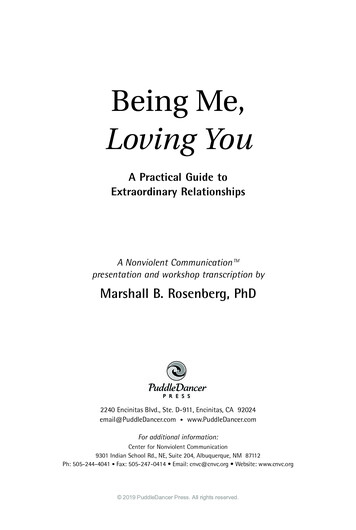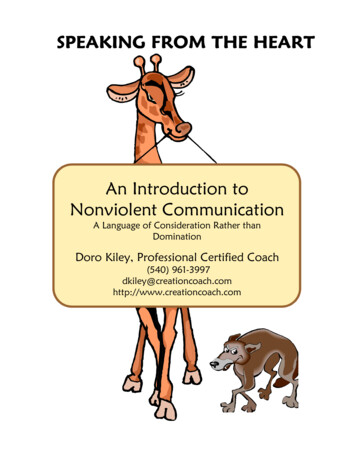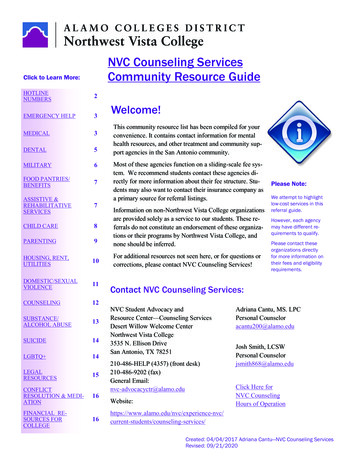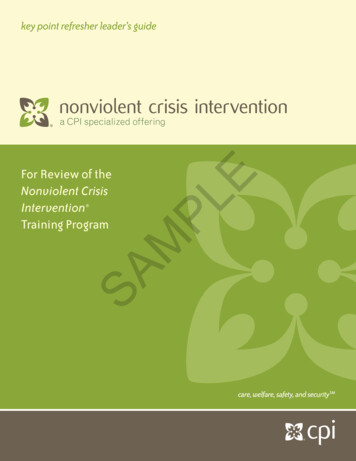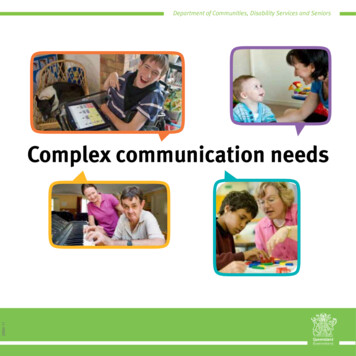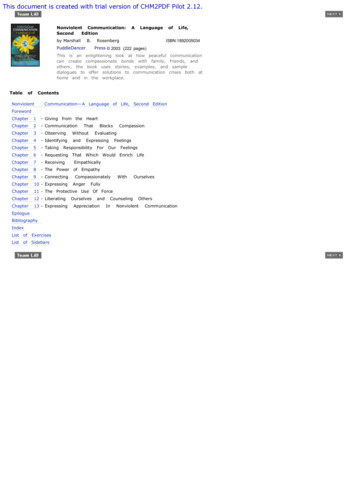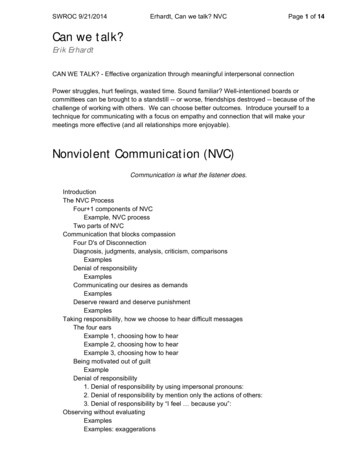
Transcription
SWROC 9/21/2014Erhardt, Can we talk? NVCPage 1 of 14Can we talk?Erik ErhardtCAN WE TALK? - Effective organization through meaningful interpersonal connectionPower struggles, hurt feelings, wasted time. Sound familiar? Well-intentioned boards orcommittees can be brought to a standstill -- or worse, friendships destroyed -- because of thechallenge of working with others. We can choose better outcomes. Introduce yourself to atechnique for communicating with a focus on empathy and connection that will make yourmeetings more effective (and all relationships more enjoyable).Nonviolent Communication (NVC)Communication is what the listener does.IntroductionThe NVC ProcessFour 1 components of NVCExample, NVC processTwo parts of NVCCommunication that blocks compassionFour D's of DisconnectionDiagnosis, judgments, analysis, criticism, comparisonsExamplesDenial of responsibilityExamplesCommunicating our desires as demandsExamplesDeserve reward and deserve punishmentExamplesTaking responsibility, how we choose to hear difficult messagesThe four earsExample 1, choosing how to hearExample 2, choosing how to hearExample 3, choosing how to hearBeing motivated out of guiltExampleDenial of responsibility1. Denial of responsibility by using impersonal pronouns:2. Denial of responsibility by mention only the actions of others:3. Denial of responsibility by “I feel because you”:Observing without evaluatingExamplesExamples: exaggerations
SWROC 9/21/2014Erhardt, Can we talk? NVCPage 2 of 14Identifying and expressing feelingsExampleExample, destructive, guilt-inducing use of feelingsFeelings versus non-feelings1. Distinguish feelings from thoughts (opinion, interpretations).2. Distinguish between words that express feelings and those that describe what wethink we are (self opinion).3. Differentiate between words that express feelings and those that describe how wethink others are evaluating us. (opinion).4. Differentiate between words that express feelings and those that describe how wethink others are behaving towards (or around) us.Interpretations we confuse with feelingsExamplesFeelings when our needs are satisfiedFeelings when our needs not are satisfiedThe needs at the root of our feelingsFrom emotional slavery to emotional liberationExamplesSome basic needs we all shareRequesting that which would enrich lifeExamplesMaking requests consciouslyAsking for a reflectionRequests versus demandsCamouflaged demandsExamples (observation, feeling, need and request)These materials available C/SWROC Session7 ErikErhardt CanWeTalk NVC.pdf
SWROC 9/21/2014Erhardt, Can we talk? NVCPage 3 of 14IntroductionNonviolent Communication is a giving and receiving of messages that centers on two veryimportant questions:1. What’s alive in us? and2. What can we do to make life more wonderful?It requires great honesty and openness, developing a certain literacy of expressions, andovercoming deeply ingrained learning that emphasizes judgment, fear, obligation, duty,punishment and reward, and shame.Everything we do is in service of our needs.This intention is to create the quality of connection with other people and oneself that allowscompassionate giving to take place.We are giving service to others and ourselves –not out of duty or obligation, not out of fear ofpunishment or hope for a reward, not out of guilt or shame, but for what I consider part of ournature. It’s in our nature to enjoy giving to one another.NVC guides us in reframing how we express ourselves and hear others. Instead of beinghabitual, automatic reactions, our words become conscious responses based firmly on anawareness of what we are perceiving, feeling and wanting. We are led to express ourselves withhonesty and clarity, while simultaneously paying others a respectful and empathic attention. Inany exchange we come to hear our own deeper needs and those of others.The NVC ProcessObservation, feeling, need, requestFour 1 components of NVC1. Observe the situation without evaluating or judging.A pure observation is without comparison to the past.2. Identify a feeling.Feelings are always related to your body, and never involve others.3. Identify your need or desire.A psychic or basic need is always about oneself, not about another, and is always abasic human quality.4. Formulating a request.Phrase a specific request positively, speaking kindly, but firmly and clearly, withoutunnecessary emotion such as sarcasm.5. Obtain feedback on everything you have done so far."Am I on the right track with this conversation?" or "Time out. How are we doingresolving this issue?"
SWROC 9/21/2014Erhardt, Can we talk? NVCPage 4 of 14Example, NVC process“Felix, when I (1) see socks under the coffee table I (2) feel irritated because I am needing (3)more order in the room that we share in common.(4) Would you be willing to put your socks in your room or in the washing machine?[If the response lacks clarity or seems disconnected, then request feedback.](5) So I know that you understood me, would you tell me what you heard me say?”Two parts of NVC1. Expressing honesty through the four components2. Receiving emphatically through the four componentsCommunication that blocks compassion(life-alienating communication)In the world of judgments, our concern on WHO “IS” WHAT.Four D's of Disconnection1.2.3.4.Diagnosis (judgment, analysis, criticism, comparison)Denial of ResponsibilityDemand'Deserve' oriented languageDiagnosis, judgments, analysis, criticism, comparisonsBlame, insults, put-downs (critical remark), labels, criticism, comparisons, and diagnoses are allforms of judgment.When we judge, as a result, we increase defensiveness and resistance from others. If they doagree to act in harmony with our values because they concur with our analysis of theirwrongness, they will likely do so out of fear, guilt, or shame.Examples “The problem with you is that you’re too selfish.”“She is lazy.”“It is wrong.”“If you don’t help me I won’t lend it to you.” (demand with punishment)“It is going to be a shame if you don’t show up.” (demand with blame)“Why can’t you be like your brother?” (comparison)“You are so stupid.” (labeling and insult)“You are so intelligent.” (positive labeling)Denial of responsibilityWe are each responsible for our own thoughts, feelings, and actions. The phrase “You make mefeel guilty” is an example of how language facilitates the denial of personal responsibility for ourown feelings and thoughts.
SWROC 9/21/2014Erhardt, Can we talk? NVCPage 5 of 14Examples “I cleaned my room because I had to.” – impersonal forces.“I drink because I am alcoholic.” – diagnosis or psychological history.“I hit my child because he ran into the street.” – action of others.“I lied because my boss told me to.” – dictates of authority.“I start smoking because all my friends did.” – group pressure.“I have to suspend you because it is the school policy.” – institutional policies rules, andregulations.“I do it because I am a husband and a father.” – gender, social, or age roles.Replace “I have to” with “I choose to”, and “I should” with “I might”.Communicating our desires as demandsA demand explicitly or implicitly threatens listeners with blame or punishment if they fail tocomply. It is a common form of communication in our culture, especially among those who holdposition of authority.Examples “You have to attend school until you’re 16.” – demand language“We’d like you to attend school until you’re 16 because we value a solid education.” –without demandDeserve reward and deserve punishmentLife-alienating communication is also associated with the concept that certain actions meritreward while others merit punishment.Examples “He deserves to be punished for what he did.” – It assumes “badness” and calls forpunishment to make them repent and change their behavior. It is in everyone’s interestthat people change, not in order to avoid punishment, but because they see the changeas benefiting themselves.“People who hurt others deserve to be punished.” – deserve oriented language“I’d like to see people who hurt others be given the opportunity to make amends for harmthey caused because I value healing and restoration of trust.” – NVCTaking responsibility, how we choose to hear difficult messagesWe are each responsible for how we hear what other people are saying.The four earsThe giraffe part of us sees two ways to connect in any moment.Giraffe ears in senses our own feelings and needs.Giraffe ears out senses the feelings and needs of the other person.The giraffe is keenly aware of the choices she is making in every moment.
SWROC 9/21/2014Erhardt, Can we talk? NVCPage 6 of 14The jackal part of us uses judgements, criticism, and blaming to break connection.Jackal ears in judges and criticizes oneself, submitting.Jackal ears out judges and blaming the other person, attacking.The jackal may not see choices, but often responds in a habitual or automatic manner.Example 1, choosing how to hear“You are the most self-centered person I’ve ever met.” Jackal in, choose to take it personally, and accept the other person’s judgment andblame ourselves (guilt, shame, depression): “Oh, I should’ve been more sensitive!” Jackal out, blame the speaker (and feel anger): “You have not right to say that! I amalways considering your needs, You’re the one who is really self-centered.” Giraffe in, shine the light of consciousness on our own feelings and needs: “When I hearyou saying that I am the most self-centered person you’ve ever met, I feel hurt, becauseI need some recognition on my efforts to be considerate of your preferences.” Giraffe out, shine the light of consciousness on the other person’s feelings and needs asthey are currently expressed: “Are you feeling hurt because you need moreconsideration for your preferences?”Example 2, choosing how to hearPerson A: How dare you walk out of the room when I’m talking! You inconsiderate S.O.B.! Youjust can’t stand to hear the truth. Jackal out, Person B (blaming A): Me the S.O.B. how about you! You’re the one whostarted all this in the first place. You are so self-righteous telling me I’m inconsiderate.You’ve never thought about another human being besides yourself! Jackal in, B (blaming himself): Oh, I’m sorry. I didn’t mean to be disrespectful. It’s justthat I don’t know what to do. I never know what to do, or what to say. I feel so worthless! Giraffe in, B (sensing his own feelings/needs): When I hear you say that, I feel hurtbecause I’m needing respect and to be seen for who I am. And I really need some spacebecause I’m in a lot of pain right now Would you be willing to tell me what you heardme just say? Giraffe out, B (sensing A’s feelings/needs): Are you feeling angry and wanting respectand to be heard? Example 3, choosing how to hear[Mother has a 1-1/2 hour coffee with a friend her first time away from the children in 3 days.]6-Year-Old: Mama I don’t want you to go! What could be more important than being with me?!(tugging at her leg, crying loudly) Jackal out, M (blaming child): Let go of my leg! And be quiet! You’ve got no reason to cry I’ve been with you all day. You always make this so hard! when all I want to do ishave a few minutes to myself! Jackal in, M (blaming herself): Oh, my gosh, I’ve really upset you! Why do I always dothis?! Why am I so selfish? I’m such an awful mother. Giraffe in, M (sensing her own feelings/needs): Honey, I’m really feeling exhausted andneeding to just have some personal time to connect with my good friend, Betty. Wouldyou be willing to let Mary (the babysitter) hold you? Giraffe out, M (sensing her child’s feelings/needs): Are you feeling sad and wanting to beheld? Are you feeling hurt and needing to know that you are loved?
SWROC 9/21/2014Erhardt, Can we talk? NVCPage 7 of 14Being motivated out of guiltThe basic mechanism of motivating by guilt is to attribute the responsibility for one’s ownfeelings to others.Example“It hurts Mommy and Daddy when you get poor grades at school.”The parents are implying that the child’s actions are the cause of their happiness orunhappiness. On the surface, feeling responsible for the feelings of others can easily bemistaken for positive caring. It appears that the child cares for the parent and feels bad becausethe parent is suffering. However, if children who assume this kind of responsibility change theirbehavior in accordance to parental wishes, they are not acting from the heart, but acting toavoid guilt.Denial of responsibilityIn each of these instances, we can deepen our awareness of our own responsibility bysubstituting the phrase: “I feel because I ”1. Denial of responsibility by using impersonal pronouns: “It really infuriates me when spelling mistakes appear in our public brochures.”“I feel infuriated when spelling mistakes like that appear in our public brochures,because I want our company to project a professional image.” - NVC“That bugs me a lot.” – denial responsibility“Little things people say sometimes hurt me.” – denial responsibility“Sometimes when people say little things, I feel hurt because I want to be appreciated,not criticized.” – NVC2. Denial of responsibility by mention only the actions of others: “When you don’t call me on my birthday, I feel hurt.”“Mommy is disappointed when you don’t finish your food.”“Mommy feels disappointed when you don’t finish your food, because I want you to growup strong and healthy.” - NVC“You irritate me when you leave company documents on the conference room floor.”“I’m irritated when you leave company documents on the conference floor, because Iwant our documents to be safely stored and accessible.” – NVC“I feel frustrated when you come late.”“I feel frustrated when you come late, because I was hoping we’d be able to get somefront-row seats.” – NVC“I feel happy that you received that award.” – positive Denial resp.“When you received that award, I felt happy because I was hoping you’d be recognizedfor all the work you’d put into the project.” – NVC3. Denial of responsibility by “I feel because you”: “I feel hurt because you don’t love me.”“I feel angry because the supervisor broke her promise.”“I feel angry when the supervisor broke her promise, because I was counting on gettingthat long weekend to visit my brother.” - NVC
SWROC 9/21/2014 Erhardt, Can we talk? NVCPage 8 of 14“I feel disappointed because you said you would do it and you didn’t.”“When you said you’d do it and then didn’t, I feel disappointed because I want to be ableto rely upon your words.” – NVCObserving without evaluatingOne specific thing that a person did is what I call an observation. What do people do that weeither like or don’t like?We want to communicate the behavior without mixing in a diagnosis, judgment, or evaluation.Examples “John was angry with me yesterday for no reason.” – evaluation“John told me he was angry” - observation“John pounded his fist on the table” - observation “My father is a good man.” – evaluation“For the last 25 years my father has given one tenth of his salary to charity.” observation “Janice work too much.” – evaluation“Janice spent over 60 hours at the office this week.” - observation “Henry is aggressive.” – evaluation“Henry hit his sister when she switched the television channel.” - observation “You are a responsible child.” – evaluation (positive labeling)“You are too generous.” – evaluation (positive labeling)“When I see you doing that I think you being too generous” - NVC “You are going to fall” – evaluation (statement with no possibilities)“Be careful, I fear that you could fall” – NVC “He is a poor soccer player” – evaluation (negative label)“He has not scored a goal in 20 games” – NVC (observation)Examples: exaggerations “My son often doesn’t brush his teeth.” – evaluation“Twice this week my on didn’t brush his teeth before going to bed.” - observation “Luke told me I didn’t look good in yellow.” - observation“Pam was first in line every day this week.” - observation “My aunt complains when I talk with her.” – evaluation“My aunt called me three times this week, and each time talked about people whotreated her in ways she didn’t like.” - observation
SWROC 9/21/2014Erhardt, Can we talk? NVCPage 9 of 14 “My husband hardly express any affection.” - evaluation“My husband hasn’t kissed me for two weeks.” - observation “You are arguing with me for the fourth time this week.” - evaluation“This is the fourth time this week that you stated you disagree with something I’msaying.” - observation “They are destroying the environment.” – evaluation“They have cut over 90% of this territory, and are still continuing.” – observation “The doctor refuses to explain anything to me.” - evaluation“The doctor did not say anything to me about what causes the pain or what can bedone.” – observationIdentifying and expressing feelingsTo say clearly what’s alive in us at any given moment we have to be clear about what we feeland what we need. Let’s start with the feelings.ExampleOne student in the university I was working with wanted to work on his roommate.Friend: “Ok, what is the behavior that your roommate does that you don’t like?”Student: “He plays the radio late at night when I am trying to sleep.”Friend: “Ok, now tell me how do you feel when he does that?”Student: “I feel it is wrong.”Friend: “I am not making clear then what I mean by feelings. ‘It’s wrong’ is what I would call ajudgment of the other person. I’m asking you how you feel. What emotions do you feel? How doyou feel?”Student: “Well, I think that when a person is so insensitive to other people, it ’s evidence of apersonality disturbance.”Friend: “Hold it, hold it. You’re still up in your head analyzing his wrongness. I’m asking, go intoyour heart, just listen to your body for a moment. How do you feel when he plays the radio lateat night?”Student: “I feel pissed off.”Friend: “Ok, there are other ways of saying it, but that is Ok.”Feelings can be used in a destructive way if we try to imply that other people’s behavior are thecause of our feelings. The cause of our feelings is not other people’s behavior, it is ourneeds. It’s not what other people do that can hurt you: it’s how you take it.Example, destructive, guilt-inducing use of feelings “It hurts me when you don’t clean up your room.”“You make me angry when you hit your brother.”
SWROC 9/21/2014Erhardt, Can we talk? NVCPage 10 of 14Feelings versus non-feelingsNVC distinguish the expressions of actual feelings from words and statements that describethoughts, opinion, assessments, and interpretations.1. Distinguish feelings from thoughts (opinion, interpretations). “I feel that you should know better.” – thought (“I think ”)“I feel frustrated.” – feeling“I feel it is useless.” – thought (“I think ”)“I feel scared when you say that” – feeling“I feel you don’t love me.” – opinion (“I think ”)“I am sad that you’re living” – feeling“I feel you are annoying me on purpose.” – opinion (“I think ”)“I am upset because I think you are annoying me purpose.” – feeling“I feel I am being unkind to them.” – opinion (“I think ”)“I feel regret around how I am behaving towards them.” – feeling2. Distinguish between words that express feelings and those that describe whatwe think we are (self opinion). “I feel inadequate as a guitar player.” – opinion of my ability“I feel (disappointed, impatient, frustrated) with myself as a guitar player.” - feelings3. Differentiate between words that express feelings and those that describe howwe think others are evaluating us. (opinion). “I feel unimportant to the people with whom I work.” – how I think other are evaluatingme.4. Differentiate between words that express feelings and those that describe howwe think others are behaving towards (or around) us. “I feel misunderstood.” – my opinion about the other person level of understanding.“I feel ignored.” – again it is an interpretation of the action of others rather than a clearstatement of how we are feeling.“When you don’t greet me, I feel neglected.” – interpretation“When you don’t greet me at the door, I feel lonely.” - feelingInterpretations we confuse with feelings(see the "Jackal list" on the back of the Needs and Feelings Inventory handout)abandoned, abused, attacked, belittled, betrayed, blamed, ., violated, wrongedExamples “I am happy that you can come.” – feeling“I feel disturbed” - feeling“I feel like hitting you” - opinion“I’d be furious too if that had happened to me.” – interpretation“I feel concerned that this happened to you. I would have been furious if it had been me.”– feeling“You are wearing me out.” – opinion (denial of responsibility)“I feel exhausted.” – feeling
SWROC 9/21/2014Erhardt, Can we talk? NVCPage 11 of 14Feelings when our needs are satisfied(see the Needs and Feelings Inventory handout)affectionate, confident, engaged, inspired, excited, exhilarated, grateful, hopeful, joyful,peaceful, refreshedFeelings when our needs not are satisfied(see the Needs and Feelings Inventory handout)afraid, annoyed, angry, aversion, confused, disconnected, disquiet, embarrassed, fatigue, pain,sad, tense, vulnerable, yearningThe needs at the root of our feelingsIt is when people see the needs of another person that it stimulates their enjoyment of giving –because we can identify with needs. All humans have the same basic needs.Interpretations, criticisms, diagnoses, and judgments of others are actually alienatedexpressions of our unmet needs.When people begin talking about what they need rather than what’s wrong with one another, thepossibility of finding ways to meet everybody’s needs is greatlyincreased.From emotional slavery to emotional liberation1. Emotional slavery – we believe ourselves responsible for the feelings of others.2. Obnoxious – we feel angry; we no longer want to be responsible for others’ feelings.3. Emotional liberation – we respond to the needs of others out of compassion, never out offear, guilt, or shame. We accept full responsibility for our own intentions and actions, butnot for the feelings of others.We are aware that we can never meet our own needs at the expense of others. Emotionalliberation involves stating clearly what we need in a way that communicates we are equallyconcerned that the needs of the others be fulfilled.Examples “I feel angry when you say that, because I am wanting respect and I hear your words asan insult.” - NVC“I am sad that you won’t be coming for dinner because I was hoping we could spend theevening together.” - NVC“I feel scared when you raise your voice.”“When you raise your voice, I feel scared because I’m telling myself someone might gethurt here, and I need to know that we’re all safe.” - NVC“I am grateful that you offered me a ride because I was needing to get home before mychildren.” - NVC
SWROC 9/21/2014Erhardt, Can we talk? NVCPage 12 of 14Some basic needs we all share(see the Needs and Feelings Inventory handout)autonomy, connection, honesty, meaning, peace, physical well-being, playRequesting that which would enrich lifeWhat can be done to make life more wonderful? Make a specific, clear request in positive actionlanguage.Focus on what we want to do rather than what went wrong.Examples “Please do not shout in this room.” – negative request“Please talk in low voice in this room.” - NVC “I want you to stop drinking.” – negative request“I want you to tell me what needs of yours are met by drinking, and to discuss with meother ways of meeting those needs.” – NVC “I want you to understand me.” – vague action“I want you to tell me what you heard me say.” – NVC “I’d like you to tell me one thing that I did that you appreciate.” – NVC“I would like you to drive in a better way” – vague action“I would like you to drive at or below the speed limit.” - NVC “I’d like you to feel more confidence in yourself.” – vague action“I’d like you to take a course in assertiveness training, which I believe would increaseyour self-confidence.” – NVC “I’d like you to be honest with me about yesterday’s meeting.” – vague action“I want you to tell me how you feel about what I did and what you’d like me to dodifferently.” – NVC “I’d like to get to know you better.” – vague action“I’d like you to tell me if you would be willing to meet for lunch once a week.” – NVC “I would like you to show respect for my privacy.” – vague action“I’d like you to agree to knock before you enter my office.” – NVCMaking requests consciouslyWe are often not conscious of what we are requesting. It may not be clear to the listener whatwe want them to do when we simply express our feelings. Request unaccompanied by the
SWROC 9/21/2014Erhardt, Can we talk? NVCPage 13 of 14speaker’s feelings and needs may sound like a demand. The clearer we are on what we wantback from the other person, the more likely it is that our needs will be met.Asking for a reflectionTo make sure the message we sent is the message that’s received, ask the listener to reflect itback and express appreciation when your listener tries to meet your request for a reflection.“I’m grateful to you for telling me what you heard. I can see that I didn’t make myself as clear asI’d have liked so let me try again.”Requests versus demandsRequests are received as demands when others believe they will be blamed or punished if theydo not comply. When people hear us make a demand, they see only two options: submission orrebellion. Either way the person requesting is perceived as coercive, and the listener’s capacityto respond compassionately to the request is diminished. The more people hear demands, theless they enjoy being around us.The most powerful way to communicate that we are making a genuine request is to empathizewith people when they don’t respond to the request. If we are prepared to show an empathicunderstanding of what prevents someone from doing as we asked, then by definition, we havemade a request, not a demand.Is that a request or a demand? “I would like you to hang up your clothes when you are finished with them.”We don’t know yet. What determines the difference between a request and a demand is how wetreat people when they don’t respond to our request.Observe what the speaker does if the request is not complied with.It’s a demand if the speaker then criticizes or judges instead of empathizing. J - “I am lonely and would like you to spend the evening with me.” L - “Jack, I’m really tired.” J – “You know how lonely I am feeling. If you really loved me, you’d spend the eveningwith me.” – demand (guilt trip)In order for them to trust that it’s a request, they need to know that they can disagree and beunderstood.Anytime somebody does what we ask out of guilt, shame, duty, obligation, or fear ofpunishment, we’re going to pay for it.We can help others trust that we are requesting, not demanding, by indicating that we wouldonly want the person to comply if he or she can do so willingly.“Would you be willing to set the table?” rather than “I would like you to set the table.”
SWROC 9/21/2014Erhardt, Can we talk? NVCPage 14 of 14Camouflaged demandsIf our objective is to change people and their behavior or to get our way, then NVC is not anappropriate tool.The purpose is to create a quality of connection that allows us to give to one another out of thejoy of compassionate giving. It’s not just to get what you want. If the other person senses thatwe have single-mindedness of purpose to get our request complied with, it changes the game.Then it turns our requests into camouflaged demands.Examples (observation, feeling, need and request) “Your dog just made a mess on my lawn.”“When I see your dog leaving turds on the lawn, I feel upset. We have kids who playhere and I want the yard to be safe, clean space for them. Would you be willing to usethis plastic bag to remove the turds?” “Yelling obscenities isn’t going to get you what you want.”“When I hear you addressing me like that, I feel agitated because I need cooperationand a peaceful resolution of our differences. Are you willing to tell me what you arefeeling and needing right now instead of what you think I am?” “By putting your money in mutual funds, you are just supporting guns and tobacco andsweat shops and all the things we’re trying to change in this world.”“When I hear you have put your money in mutual funds, I feel dejected because I’d liketo see us put our resources into what we value, rather than to support guns, tobacco,and sweatshops. Would you be willing to tell me what you are feeling when you hear mesay this?” “Hey kids, flashlights aren’t toys. Don’t waste batteries. They cost money.”“When I see you kids playing with the flashlights under the blanket, I feel uneasy. I wantthese flashlights to last so they’ll be available if we have an emergency. Would you bewilling to put them away?” “But you told me two weeks ago that it would be fine if I were to take a long weekend thismonth.”“When I hear you say ‘no’ to my taking a long weekend this month and then rememberyou saying two weeks ago that it would be fine, I feel frustrated and confused. I needmore clarity and some reassurance that we are communicating accurately. Would yoube willing to tell me what you just heard me say.” Much more NVC at cnvc.org.
EDamazedWHEN YOURanimatedCONNECTIONNEEDS CTIONATE xercise icclosenesslovingsexual expression open enessEXHILARATEDintimacyopencelebration of life rit
SWROC 9/21/2014 Erhardt, Can we talk? NVC Page 6 of 14 The jackal part of us uses judgements, criticism, and blaming to break connection. Jackal ears in judges and criticizes oneself, submitting. Jackal ears out judges and blaming the other person, attacking. The jackal may not see choic

